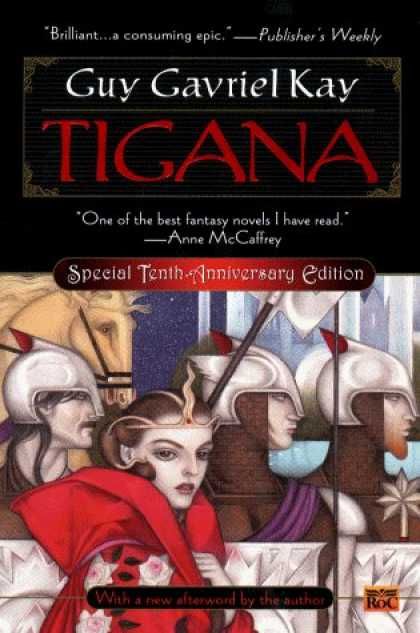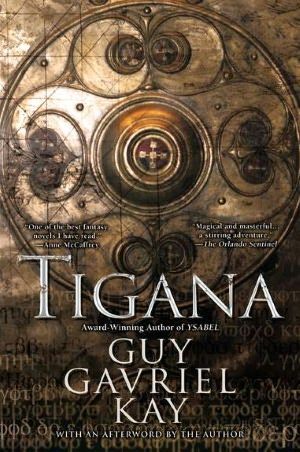Kay, Guy Gavriel: Tigana

Tigana (1990)
Written by: Guy Gavriel Kay
Genre: Epic Fantasy
Pages: 676 (Trade Paperback)
Why I Read It: I first learned of Guy Gavriel Kay when I attended the Odyssey Writing Workshop in 2005. Many of my classmates praised his work, and Tigana was named a favorite. So I've had Tigana in my TBR pile for a while, but never picked it up because the length was SO intimidating. However, thanks to the You Dare Me nominations, I was finally "forced" to sit down and take the time to read this book to see what Kay's standalone epic fantasy had to offer.
The premise: ganked from BN.com: Kay (The Fionavar Tapestry) brings to life a layered, pragmatic world of magic and difficult choices, where brutality and beauty coexist. Eight of the nine provinces of the Peninsula of the Palm, on a world with two moons, have fallen to the warrior sorcerers Brandin of Ygrath and Alberico of Barbadior. Brandin's younger son is slain in a battle with the principality of Tigana, which the grief-stricken sorcerer then destroys. Years later, a small band of survivors, led by Alessan, last prince of Tigana's royal house, wages psychological warfare, planting seeds for the overthrow of the two tyrants. At the center of these activities are Devin, a gifted young singer; Catriana, a young woman pursued by suspicions of her family's guilt; and Duke Sandre d'Astibar, a wily resistance leader thought dead. Meanwhile, at Brandin's court, Dianora, his favorite concubine and--unknown to anyone, another survivor of Tigana--struggles between her growing love for the often gentle tyrant and her desire for vengeance. Gradually the scene is set for both conquerors to destroy each other and free a land. Tolkien protege Kay's brilliant and complex portrayal of good and evil, high and low, will draw readers to this consuming epic.
Spoilers, yay or nay?: Yay. So if you haven't yet read this book, skip to "My Rating" and you'll be just fine. Everyone else, onward!

Discussion: It's a difficult thing, writing a review of a book that you know is well-loved, attempting to write something that will do the book justice. It's funny, because most books I read are one-night stands: I'll read them once, but I'll never really need to read them again. Others, however, get placed on the mental re-read shelf (I should make this a real thing on LibraryThing, really). I know I won't re-read this book any time soon, but I also know I'm kidding myself to think I even began to scratch the surface of this story and what it has to offer.
So what can I say about an epic fantasy that's nearly 700 pages long? It's the fourth book I've read by Kay (Ysabel, The Summer Tree, and Under Heaven, in that order), so I'm no stranger to his work. I've found the newer books to be more agreeable to me than his debut was, but that's rather unfair: Kay has a long career, and he's certainly grown as an author and storyteller since The Summer Tree, which I really didn't care for at all. But I was still worried about Tigana, just a bit. It was published six years after The Summer Tree, so it was a fair concern. But I know some seriously picky fantasy readers, one of which stated he loved this over The Lord of the Rings, so I knew Tigana wasn't a book I could fear for long.
The start was interesting. I liked seeing this calm before the storm, the eve of battle, the moment that shaped the events that ended up shaping the entire story of the book. I liked the feeling of hopelessness and resignation, but still, the sense of friendship, camaraderie, and the will to fight against all odds.
The first chapter, set in a tavern (because where else should an epic fantasy start?), did not engage me nearly as well. I was fairly overwhelmed, aware that important information was being imparted but not sure what was important and what wasn't. Not sure which characters I should focus on and which I shouldn't. It was a relief, then, to be introduced to Devin's POV. Once I started reading Devin, I found the rhythm of the story. Once Devin learned the truth of his birthplace, I was hooked into the story, happily able to forgive those one-shot POV meanderings where we'd meet someone new who would shed some light on the scene to come. I couldn't get too worked up about my POV rule in this book either: the bulk of the story is told through Devin's and Dianora's eyes, which kept me grounded. The other POVs were just tidbits, icing on the cake. Kay knows how to weave them in the narrative in such a way that they didn't feel like an intrusion, and that I appreciate greatly.
The story itself is definitely something different. I read fantasy, and I've read a decent amount of epic fantasy. Quest fantasy, if you will. And I can't think of any story with a plot quite like this, where the heroes aren't just saving the land, they're saving the name of the land. Rescuing its culture from obscurity. And that was absolutely fascinating. Even better was the characterization that went into the "villain" who did it, and the characterization of all those reacting to it. In Kay's afterword (I've got the tenth anniversary edition), he talks about creating shades of grey in all of his characters, so your heroes aren't purely good, and your villains aren't purely evil. Hell, by the end of the book, I had a certain about of sympathy and understanding for Brandin, despite learning the truth behind his Fool, which was utterly shocking, satisfying and something I feel like I should have seen coming.
Can I just say? I loved the Fool. The role, the way the Fool was portrayed, and knowing how the link between Brandin and the Fool worked made those scenes where the Fool was acting out utterly powerful and amazing.
And then consider the heroes: Alessan's (whose name kept reminding me, in a good way, of Elessar, which made me think the naming of Tigana's long-lost prince was a rather deliberate nod to The Lord of the Rings) binding of the wizard Erlein. I wondered from the start why Alessan didn't try to win them over to their cause instead of binding him unwillingly to the cause. This created quite a few uncomfortable moments in the text, where the reader is forced to sympathize with Erlein despite supporting Alessan's cause. It's awkward, making the reader realize that even heroes do bad things, so the redemption at the end, when Erlein chooses to save Catriana, and Alessan chooses to remove the binding out of belief Erlein will stay, was especially powerful.
Speaking of shades of gray: Devin didn't meet a girl he didn't want to get in bed with (he didn't sleep with Alais, but you know he wanted to). Catriana was cruel despite having a good heart. Baerd freaking slept with his sister (what is it with epic fantasy and incest? Martin, I'm looking at you!). Dianora, well, she's her own mountain of complexities, which made her passages especially interesting to read.
The role of women in Tigana, I should note, caught my eye. Not in a way I can make any critical observations, mind you. But this is a book that makes me want to sit down and examine the role of women in this book as compared to other epic fantasies and historical settings. If anyone's done this, or has some commentary to add on the subject, I'm all ears. One read is not enough for me to form any kind of opinion, though it is interesting to note that the main two female characters, Catriana and Dianora, were both very willing to sacrifice themselves for their cause, to the point of actually committing to that self-sacrifice (though both get some kind of last-minute reprieve). The men were not put into such a position. Hmmm… what does that say, if anything?
But really, one read is not really enough for me to really get into the meat of this book. There are so many things that I feel I didn't quite grasp, or things that I know I will look at differently upon a second read. Such as the role of the Night Walkers and the nature of their war, how it'd been worse since Tigana was cursed and specifically how and why and what Baerd's conclusions were. The book also makes me want to give The Fionovar Tapestry another shot before re-reading, because of Brandin's dream of Finavir, which sounds too close to the fantasy world of that previously named trilogy to be a coincidence. I want to re-read to focus more on the nature of the riselka (I was super glad to read from a physical copy of this book, so that I could keep flipping back to learn what it meant when one was seen by however many), and so that I can relish that final paragraph all over again. Jesus, what an ending. It's a perfect end, but it's also something of a cheat: you want more. You want to learn what happened to Devin, Baerd, and Sandre. You want to learn who forked, who died, and who was blessed. It's maddening NOT knowing, yet satisfying in a weird way too: you can easily make up your own theory, you know?
There were so many good scenes in this book. Tomasso's unknowing farewell to his father. Brandin's execution of Isolla. The good humor between our heroes, they way they ribbed and teased each other.
No quotes. I marked things aplenty, but I don't want to babble, so I'll wrap this up.
My Rating: 8 - Excellent
This is a book that one does not rush through. It's an epic fantasy, and as such, it takes its time to tell its story, to build its world, to flesh out its characters. Tigana is not simply about a group of ragtag heroes saving their world. There are so many other stories within, and many of the supporting characters have their own arc, all of which plays into the larger story and makes you feel like you're reading a real history of a real place. It's so rich, so complex, that even while reading you know that one day, you'll want to read it again, because there's so much to glean from this book that you'll never get it all in just one read. Well, I know I didn't. But I thoroughly enjoyed this book, and one day, I intend to re-read it and marvel at its construction all over again. But until then, I'll look forward to Kay's other work, especially the upcoming River of Stars, which will be released this April.
Cover Commentary: My edition feels a little more true to the story itself (cover pictured on top), but I really like the recent reprint cover (seen behind the cut). No, the steampunkiness of the cover really doesn't match the pages at all, but it is very, very pretty, and if given the choice, THAT's the cover I would've gotten.
Next up: The Fifty Year Sword by Mark Z. Danielewski